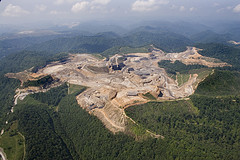
Photo courtesy of ilovemountains.org.
By Jason Fults, Gainesville Loves Mountains
For the past few decades, Appalachian coal companies have sought to erase the gains of some of the most hard-fought labor struggles in U.S. history by reducing their workforce through mechanization.
Large deep-mining operations employing union miners have been replaced with millions of pounds of explosives and draglines more than 20 stories tall. This method of coal mining is referred to as “mountaintop removal” (MTR), and as its name implies, its impact on local ecosystems is devastating.
I lived in Appalachia for several years, and it was there that images of MTR and its effects on the people and landscapes of the region were burned into my consciousness–images that I carry with me many years later.
The Environmental Protection Agency describes MTR as “…a form of surface coal mining in which explosives are used to access coal seams, generating large volumes of waste that bury adjacent streams.
The resulting waste that then fills valleys and streams can significantly compromise water quality, often causing permanent damage to ecosystems and rendering streams unfit for drinking, fishing, and swimming. It is estimated that almost 2,000 miles of Appalachian headwater streams have been buried by mountaintop coal mining.”
Residents and activists who have been fighting this practice would say that the EPA’s description is charitable.
The nexus between the devastation of MTR and our personal consumption is our municipally owned utility, Gainesville Regional Utilities. GRU purchases coal and other fuels that they then convert into electricity and sell to ratepayers.
That is why we started Gainesville Loves Mountains, a local group dedicated to working in conjunction with organizations in Appalachia to end MTR and create a prosperous future for the region.
Currently, about 62 percent of GRU’s energy mix comes from coal, and about 60 percent of that coal comes from MTR mine sites. Gainesville Loves Mountains has been meeting with GRU staff, a few City Commissioners and Mayor Craig Lowe for the past several months to discuss this issue.
Last March, we brought Larry Gibson, a resident of West Virginia and neighbor to MTR mining sites, to Gainesville.to talk. While the Commissioners, and particularly our eco-conscious mayor have been sympathetic to these concerns, they have been rebuffed by GRU staff who want no restrictions placed on their coal purchases and who insist that they only purchase coal from “reputable, law-abiding” companies.
Appalachian activists who have been fighting against MTR disagree.One staff-person at the Boone, N.C. organization Appalachian Voices said, “It looks like their suppliers are the worst of the worst, particularly Massey, Patriot, ICG (International Coal Group) and TECO Coal C. Moreover, the specific mines–from Twilight to Patriot’s mines … to ICG’s godawful complex north of Hazard–would make for the most awful visuals and compelling human stories out there.”
One issue that emerged in the public meetings in recent months is that while GRU contractually requires their coal suppliers to “obey all applicable laws,” there is absolutely no monitoring or enforcement of this requirement. The staff members at GRU, when asked, were completely unaware of any violations of the law by any of our suppliers and have instead reassured us, consistently, that “we only deal with highly reputable providers.”
So the unspoken policy has been one of plausible deniability: the less that we know about the origins of our energy, it seems, the better.
In recent months, GRU has been performing “test burns” on coal from outside of Appalachia.
If these tests are successful, Gainesville would have a larger pool to choose from, and it would be easier to avoid MTR coal. In response to citizen advocacy, GRU has agreed to require their coal suppliers to self-report any major legal violations to the utility.
Yet even as recently as last month, Assistant General Manager John Stanton continued to maintain that the upcoming round of coal contracts would be “…awarded on the basis of low total cost.”
By “total cost,” Stanton was factoring in transportation and other financial costs of burning coal. He unfortunately was not referring to the environmental and social “costs” that residents of Appalachia are paying with their lives.
While it is doubtful that GRU will change course and agree to stop purchasing MTR coal right away, the efforts of Gainesville Loves Mountains, in concert with Appalachian activists and energy consumers nationwide, can bring this egregious practice to an end.
Please remember the people of Appalachia when you turn on your lights or power up your heater this winter.
If you want to learn more about MTR and our community’s connection to it, visit ilovemountains.org. And please let our local leaders know that you want to see an end to Gainesville’s connection to mountaintop removal mining (a list of key contacts is given below).
The communities that supply our energy deserve clean water, healthy livelihoods and respect!
Please contact:
Bob Hunzinger (GRU General Manager): HunzingerRE@gru.com, (352)334-3400
Susan Bottcher (City Commissioner, chair of Regional Utilities Committee): bottchersw@cityofgainesville.org, (352)334-5015
Mayor Craig Lowe: mayor@cityofgainesville.org, (352)334-5015
Thomas Hawkins (City Commissioner): hawkinswt@cityofgainesville.org, (352)334-5015
Once you have notified local leaders and spread the message to your contacts, please “like” us on Facebook (GainesvilleLovesMountains). If you would like to do more to help win this victory, please contact Jason Fults via phone at (352)318-0060 or email Sisyphus@riseup.net.
